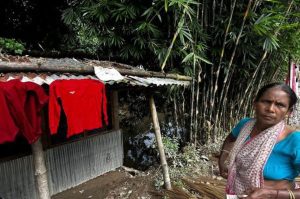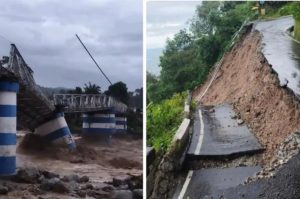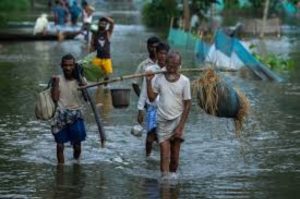West Bengal Police Launch Mobile GD — In a pioneering and citizen-centric initiative, the Alipurduar District Police have launched mobile General Diary (GD) camps to assist residents affected by the recent floods in filing reports for lost identity documents. The initiative is part of a broader effort to support flood-impacted populations, restore access to essential services, and minimize bureaucratic challenges during the recovery phase.

The mobile camps, known locally as “Duare Police” or police at your doorstep, have been strategically deployed in areas most affected by the floods, including Nagrakata, Salkumarhat-I and II, and Bittibari in Kumargramduar, ensuring that residents can report lost documents without traveling long distances to police stations.
Background: Devastation Caused by Recent Floods
The floods that swept across North Bengal earlier this month left thousands of residents stranded, homes submerged, and essential documents, including identity cards, bank papers, and educational certificates, lost or destroyed.


During a visit to flood-hit areas, Chief Minister Mamata Banerjee emphasized that officials must remain closely engaged with affected communities, ensuring immediate relief and facilitating recovery processes. Following this directive, the Alipurduar District Police mobilized resources to directly assist residents in recovering lost identity documents, a step critical for accessing government welfare, banking, and social services.
Services Offered at Mobile GD Camps
The mobile GD camps provide residents with a one-stop solution for document recovery and replacement, including filing General Diaries for:
- Aadhaar Cards
- Voter ID Cards
- PAN Cards
- Ration Cards
- Bank/Debit Cards
- Educational Certificates (School/College)
These services are particularly important for residents who have lost homes, personal belongings, and proof of identity, which are essential for accessing government relief schemes and rebuilding livelihoods.


In addition to filing GDs, residents receive guidance on procedures for obtaining duplicate documents and information about relevant government support programs. Trained personnel at the camps ensure that the documentation process is streamlined, reducing bureaucratic delays and stress for affected citizens.
West Bengal Police Launch Mobile GD: Community Response and Testimonials
The initiative has been widely appreciated by flood-hit communities. Residents expressed relief at the accessibility of the camps, emphasizing that they saved both time and physical effort in a challenging post-disaster environment.
- A resident from Salkumarhat-I said: “We lost almost everything in the flood, including our identity documents. The police visiting our homes to file GDs is a huge relief. We can now start the process of getting new documents without leaving the village.”
- Another resident from Bittibari remarked: “Traveling to the police station would have been difficult, especially for elderly and vulnerable people. These mobile camps show that the government and police care about us.”
These testimonials highlight the significance of the initiative in restoring confidence, dignity, and a sense of security among affected populations.
Coordination and Role of Authorities
The mobile camps are being coordinated under the leadership of Superintendent of Police Y. Raghuvamshi, who emphasized that the police’s role extends beyond enforcement—it includes supporting communities during crises.
Local administrative officers are also collaborating with police teams, providing additional guidance on government relief measures and assisting residents in navigating the documentation process. This collaboration ensures a seamless experience for residents, integrating law enforcement and civil administration in disaster recovery.
Challenges Faced by Flood Victims
Flood-affected populations face numerous obstacles in reclaiming lost identity documents:
- Travel Constraints: Many residents live in remote areas where reaching police stations or administrative offices can be difficult.
- Document Dependencies: Government relief programs, banking services, and social welfare schemes require proof of identity, which flood victims may have lost.
- Time-Sensitive Recovery: Delays in filing GDs and obtaining duplicate documents can hinder access to emergency support and long-term rehabilitation assistance.
By bringing services directly to communities, the mobile camps effectively address these challenges, ensuring that residents can quickly begin the process of document replacement and regain access to essential services.
Expansion and Replication of the Initiative
Encouraged by the success of the mobile camps in Alipurduar, authorities are planning to replicate the model in other flood-affected districts, including Jalpaiguri, Kalimpong, Darjeeling, and Cooch Behar.
The initiative is expected to serve as a model for community-oriented disaster response, integrating mobile law enforcement, administrative support, and public engagement. Long-term objectives include:
- Streamlining documentation processes through digital platforms.
- Reducing dependency on centralized offices, particularly in rural and flood-prone areas.
- Enhancing community resilience by providing timely assistance and guidance.
Government and External Support Resources
Residents can access additional support and official guidance for document replacement and filing General Diaries through the following government portals:
- Ministry of Home Affairs – National Crime Records Bureau
- West Bengal Police Official Website
- UIDAI – Aadhaar Services
- Voter Helpline Portal
- Public Grievance Redressal Portal, Government of India
These portals provide step-by-step instructions, official forms, and helplines to ensure flood victims can efficiently recover or replace lost identity documents.
Community Engagement and Awareness
Alongside the filing of GDs, the mobile camps also serve as educational hubs to raise awareness about:
- Protecting important documents during disasters.
- Accessing government relief programs and schemes.
- Reporting fraud or unauthorized use of lost identity documents.
By educating communities, authorities aim to empower residents, improve civic literacy, and strengthen resilience in future emergencies.
Long-Term Implications
The doorstep GD camps represent more than immediate disaster relief—they signify a strategic approach to governance, citizen support, and public trust-building.
- Enhanced Trust: By assisting residents during times of vulnerability, authorities reinforce the public’s trust in law enforcement and government institutions.
- Improved Disaster Preparedness: Lessons learned from this initiative can inform emergency planning for future floods and natural disasters.
- Digitalization and Record Management: The integration of digital solutions for documentation and record-keeping reduces the risk of future losses.
- Community Resilience: Providing accessible services fosters self-reliance and confidence among affected populations.
Conclusion
The Alipurduar police doorstep GD initiative exemplifies a holistic approach to disaster recovery, combining law enforcement, administrative support, and community engagement to address the urgent needs of flood-affected residents.
By facilitating the filing of General Diaries for lost identity documents and providing guidance on replacement procedures, authorities ensure that residents can resume normal life, access welfare services, and regain their sense of security.
As the program expands to other flood-impacted districts in North Bengal, it is set to serve as a model of inclusive, community-centered governance in times of crisis, demonstrating the importance of proactive, compassionate, and accessible public service.
Government and Official External Links for Reference:
- West Bengal Police
- UIDAI – Aadhaar Services
- Voter Helpline Portal
- National Crime Records Bureau
- Public Grievance Redressal Portal, Government of India
Also read: Home | Channel 6 Network – Latest News, Breaking Updates: Politics, Business, Tech & More

